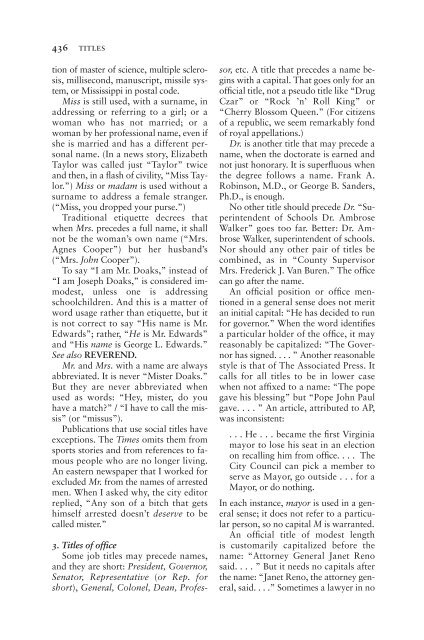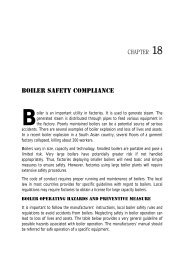The Penguin Dictionary of American English Usage and Style : A ...
The Penguin Dictionary of American English Usage and Style : A ...
The Penguin Dictionary of American English Usage and Style : A ...
Create successful ePaper yourself
Turn your PDF publications into a flip-book with our unique Google optimized e-Paper software.
436 titles<br />
tion <strong>of</strong> master <strong>of</strong> science, multiple sclerosis,<br />
millisecond, manuscript, missile system,<br />
or Mississippi in postal code.<br />
Miss is still used, with a surname, in<br />
addressing or referring to a girl; or a<br />
woman who has not married; or a<br />
woman by her pr<strong>of</strong>essional name, even if<br />
she is married <strong>and</strong> has a different personal<br />
name. (In a news story, Elizabeth<br />
Taylor was called just “Taylor” twice<br />
<strong>and</strong> then, in a flash <strong>of</strong> civility, “Miss Taylor.”)<br />
Miss or madam is used without a<br />
surname to address a female stranger.<br />
(“Miss, you dropped your purse.”)<br />
Traditional etiquette decrees that<br />
when Mrs. precedes a full name, it shall<br />
not be the woman’s own name (“Mrs.<br />
Agnes Cooper”) but her husb<strong>and</strong>’s<br />
(“Mrs. John Cooper”).<br />
To say “I am Mr. Doaks,” instead <strong>of</strong><br />
“I am Joseph Doaks,” is considered immodest,<br />
unless one is addressing<br />
schoolchildren. And this is a matter <strong>of</strong><br />
word usage rather than etiquette, but it<br />
is not correct to say “His name is Mr.<br />
Edwards”; rather, “He is Mr. Edwards”<br />
<strong>and</strong> “His name is George L. Edwards.”<br />
See also REVEREND.<br />
Mr. <strong>and</strong> Mrs. with a name are always<br />
abbreviated. It is never “Mister Doaks.”<br />
But they are never abbreviated when<br />
used as words: “Hey, mister, do you<br />
have a match?” / “I have to call the missis”<br />
(or “missus”).<br />
Publications that use social titles have<br />
exceptions. <strong>The</strong> Times omits them from<br />
sports stories <strong>and</strong> from references to famous<br />
people who are no longer living.<br />
An eastern newspaper that I worked for<br />
excluded Mr. from the names <strong>of</strong> arrested<br />
men. When I asked why, the city editor<br />
replied, “Any son <strong>of</strong> a bitch that gets<br />
himself arrested doesn’t deserve to be<br />
called mister.”<br />
3. Titles <strong>of</strong> <strong>of</strong>fice<br />
Some job titles may precede names,<br />
<strong>and</strong> they are short: President, Governor,<br />
Senator, Representative (or Rep. for<br />
short), General, Colonel, Dean, Pr<strong>of</strong>essor,<br />
etc. A title that precedes a name begins<br />
with a capital. That goes only for an<br />
<strong>of</strong>ficial title, not a pseudo title like “Drug<br />
Czar” or “Rock ’n’ Roll King” or<br />
“Cherry Blossom Queen.” (For citizens<br />
<strong>of</strong> a republic, we seem remarkably fond<br />
<strong>of</strong> royal appellations.)<br />
Dr. is another title that may precede a<br />
name, when the doctorate is earned <strong>and</strong><br />
not just honorary. It is superfluous when<br />
the degree follows a name. Frank A.<br />
Robinson, M.D., or George B. S<strong>and</strong>ers,<br />
Ph.D., is enough.<br />
No other title should precede Dr. “Superintendent<br />
<strong>of</strong> Schools Dr. Ambrose<br />
Walker” goes too far. Better: Dr. Ambrose<br />
Walker, superintendent <strong>of</strong> schools.<br />
Nor should any other pair <strong>of</strong> titles be<br />
combined, as in “County Supervisor<br />
Mrs. Frederick J. Van Buren.” <strong>The</strong> <strong>of</strong>fice<br />
can go after the name.<br />
An <strong>of</strong>ficial position or <strong>of</strong>fice mentioned<br />
in a general sense does not merit<br />
an initial capital: “He has decided to run<br />
for governor.” When the word identifies<br />
a particular holder <strong>of</strong> the <strong>of</strong>fice, it may<br />
reasonably be capitalized: “<strong>The</strong> Governor<br />
has signed. . . . ” Another reasonable<br />
style is that <strong>of</strong> <strong>The</strong> Associated Press. It<br />
calls for all titles to be in lower case<br />
when not affixed to a name: “<strong>The</strong> pope<br />
gave his blessing” but “Pope John Paul<br />
gave. . . . ” An article, attributed to AP,<br />
was inconsistent:<br />
...He. . . became the first Virginia<br />
mayor to lose his seat in an election<br />
on recalling him from <strong>of</strong>fice. . . . <strong>The</strong><br />
City Council can pick a member to<br />
serve as Mayor, go outside . . . for a<br />
Mayor, or do nothing.<br />
In each instance, mayor is used in a general<br />
sense; it does not refer to a particular<br />
person, so no capital M is warranted.<br />
An <strong>of</strong>ficial title <strong>of</strong> modest length<br />
is customarily capitalized before the<br />
name: “Attorney General Janet Reno<br />
said. . . . ” But it needs no capitals after<br />
the name: “Janet Reno, the attorney general,<br />
said. . . .” Sometimes a lawyer in no












